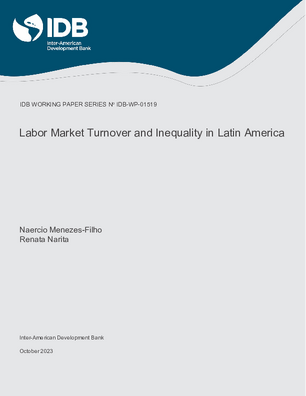Labor Market Turnover and Inequality in Latin America
Date
Oct 2023
This paper describes the patterns of worker turnover in selected Latin American countries and their implications for wage inequality. It documents a higher positive annual wage growth rate for job to job changers compared to stayers, due to turnover capturing the immediate gains from search behavior in the short run. Younger workers benefit relatively more from the positive effects of job to job changes, as expected. We also show that transitions are relatively higher within the informal sector for most countries, and particularly so for workers without college education. Moreover, total job separations and transitions from formal into informal employment occur more often among low-skill and young individuals. Next, the paper analyzes wage growth by percentiles for all workers and job-to-job movers for each country over a more extended period. We find that job to job changes are inequality reducing in the short run, consistent with search gains associated with turnover exhausting more rapidly for high-paid workers. In contrast, we find that human capital effects dominate the search effects in the long run, as human capital accumulates over time. Thus, long-run wage growth is lower for job changers than for stayers, so that, while in the short run the search effects tend to dominate those of human capital, in the long run the opposite occurs.
As unskilled workers change jobs more frequently, this suggests that job changes are inequality increasing in the long run. A potential explanation for limited wage growth in Latin American economies may include high informality rates. Policies to reduce wage inequality should focus on improving the conditions for positive turnover towards better investment and, thus, higher-quality jobs.
As unskilled workers change jobs more frequently, this suggests that job changes are inequality increasing in the long run. A potential explanation for limited wage growth in Latin American economies may include high informality rates. Policies to reduce wage inequality should focus on improving the conditions for positive turnover towards better investment and, thus, higher-quality jobs.




